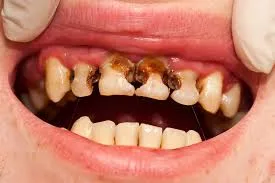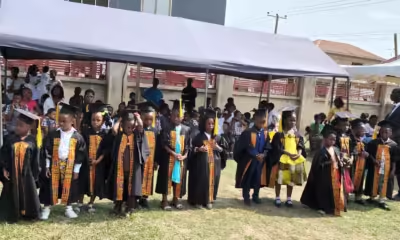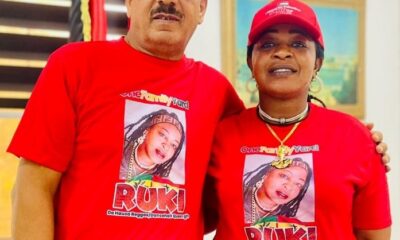Features
The Dangers of Transporting Illicit Small Arms in Ghana
Published
8 months agoon
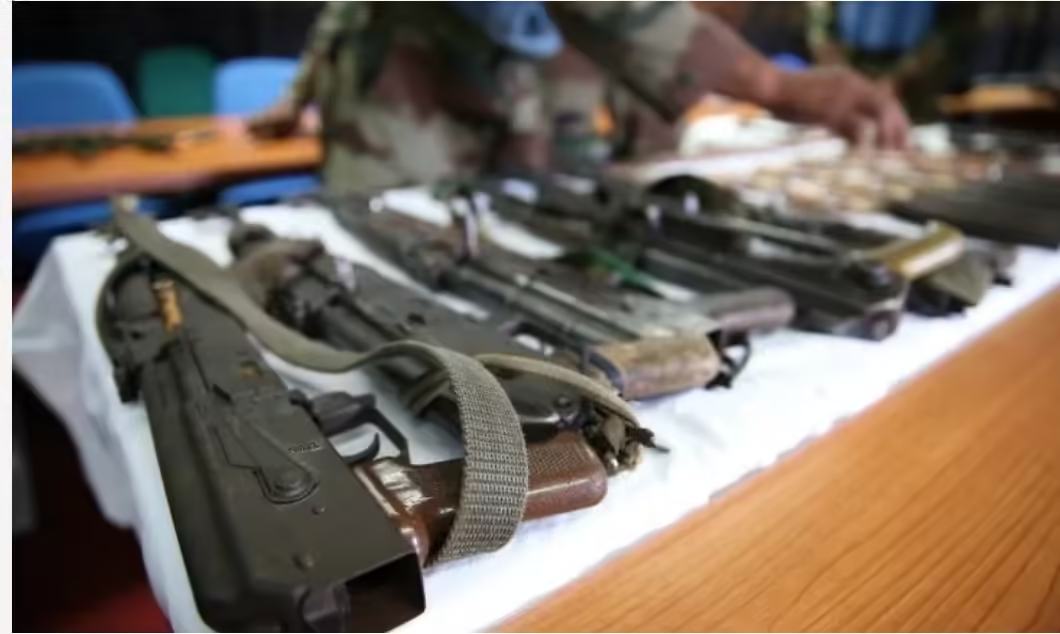
Transport systems are the lifeblood of economies worldwide, facilitating the movement of goods and people across vast distances.
However, they also play a significant role in the proliferation of illicit small arms.
In Ghana, individuals involved in the transportation of goods—such as bus, taxi, and trotro drivers, as well as parcel officers, ‘loading boys’ and ‘mates’ — may either knowingly or unknowingly facilitate the movement of illicit firearms.
Transport workers in Ghana are often at the frontline of the movement of goods across the country. However, this strategic position also makes them vulnerable to exploitation by individuals involved in the smuggling of illicit small arms.
Some transport workers may deliberately engage in these activities, leveraging their intimate knowledge of transportation routes to smuggle firearms across regions to fuel criminal activity. This illegal activity is often driven by financial incentives or coercion, where individuals are pressured or threatened by criminal elements to cooperate.
On the other hand, many transport workers unknowingly contribute to the proliferation of illicit small arms. Concealed within parcels or luggage, these deadly weapons can easily be transported across the country without the transporter’s knowledge.
The ease with which firearms can be hidden and the lack of stringent checks on goods being transported make the transportation sector a convenient channel for smuggling.
Transport workers might contribute to the proliferation of illicit arms if they unknowingly transport concealed firearms hidden within parcels.
The unregulated movement of these lethal weapons poses serious risks, including accidental discharge, theft, and diversion into the illegal arms market.
When illicit small arms fall into the wrong hands, the consequences are profound. These weapons increase the likelihood of violent crimes and domestic violence devastating harm to individuals and families.
Communal tensions, which might otherwise be resolved through dialogue or legal means, can quickly escalate into deadly conflicts when small arms are involved.
In some parts of Ghana, disputes over land, resources, or ethnic differences have turned violent, with the availability of illicit firearms exacerbating these conflicts. Moreover, they fuel terrorism and organised crime, contributing to broader societal instability.
The transportation of illicit small arms and ammunition threatens lives and undermines Ghana’s efforts to maintain peace and stability.
It perpetuates a cycle of violence and insecurity that slows down the nation’s progress towards sustainable development.
Under Ghanaian law, the burden of proof lies with anyone found transporting or possessing illicit firearms. Section 192 (1) of the Criminal and Other Offences Act, 1960 (Act 29) stipulates: “Despite the provisions of any other enactment, a person who has in possession, custody or control, without lawful excuse, the proof of which lies on that person, an explosive, a firearm or an ammunition commits a first degree felony: Provided that no prosecution shall be instituted under this section without the consent in writing of the Attorney-General.”
Convictions under this law are severe, with penalties ranging from a minimum sentence of 10 years to life imprisonment.
This underscores the importance for drivers, their mates, loading boys and parcel officers to be vigilant.
Thoroughly checking parcels before they are loaded, refusing suspicious packages, and reporting them to the Ghana Police Service or the National Commission on Small Arms and Light Weapons (NACSA) are critical steps to preventing the illicit proliferation of small arms, thereby contributing to peace and security.
Recognizing the gravity of this issue, the National Commission on Small Arms and Light Weapons continues to take proactive steps through extensive public advocacy efforts across the country, with visits to bus terminals and trotro stations, transport unions and passengers to engage with stakeholders.
Through these engagements, key players are educated about the dangers of transporting illicit firearms and the various precautions they can take to combat this threat.
Beyond awareness-raising, the Commission is working closely with law enforcement agencies to enhance the monitoring and regulation of the transport sector, ensuring that transport workers are equipped with the knowledge and tools necessary to identify and report suspicious activities.
These efforts are critical in creating a safer environment for all Ghanaians and in disrupting the networks that facilitate the movement of illicit small arms.
Tansport workers, whether inadvertently or advertently, play a crucial role in the proliferation of these deadly weapons. However, through vigilance and proactive measures, they can also be instrumental in curbing this menace.
By working together, we can silence the guns, not our future. Let us all commit to making Ghana gun-violence-free for current and future generations.
GNA
You may like


Tooth decay cases rises in Tema


Cake Tekniks holds 59th graduation ceremony


Volta College Foundation donates GH¢9,000 to 9-yr-old fire victim


ICU holds Greater Accra regional youth, women confab


Beyond the cross: The role of women in Easter story


Empress Gifty to thrill patrons at MTN Stands In Worship on Easter Sunday

Palm nut soup is a Ghanaian dish that can be served with so many foods. It has a rich base of palm nuts combined with tomatoes and various vegetables that makes it very nutritious.
Preparation
Ingredients
– 1 kilogramme of palm nut
– Half kilogramme of beef
-One kilogramme of goat meat
-Three large salmon
-One full tuna
– A handful of turkey berries
-Two large onions
-4 large tomatoes
-3 large garden eggs
– One tin of mackerel
-Ten large peppers
– One large ginger
-2 cloves of garlic
– Four fingers of okro
– Salt to taste
Instructions
-Wash, cook palm nut, turkey berries, and pepper and add salt to it.
-Grind palm nut, turkey berries and pepper with mortar and pestle or mini food processor.
-Wash goat meat, beef, Tuna, salt and put on fire.
– Blend onion, garlic, ginger and tomatoes and pour on the goat meat.
– Add smoked tuna and salmon and okro to the soup.
-Use a spoon or ladle to skim off the surface oil.
-Garnish the soup with the okro or garden eggs as desired.
-Serve with fufu, banku or Omo tuo.

● Increases hydration
● Strengthens bones
● Promotes gut health
● Helps manage blood sugar and weight
● Protects against cancer
● Improves heart health
Source: Healthtips
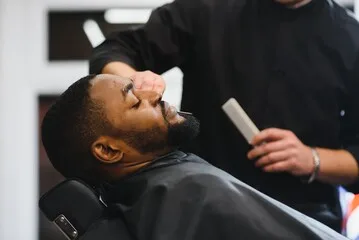
It is not easy looking for your barber if your hair has overgrown and you look like a bushman. It is even more serious if your moustache has crossed carpet and is seen entering into your nostrils, some straying into your left ear.
The problem is that some of us do not like changing barbers. My barber, for instance, is a very short akupa who often has to stand on his toes to reach the top of my head. But I maintained him because he understands the international shape of my head and gives me the right cut. Moreover, he has promised never to cut my ears.
Although, he has been cutting my hair for the last five years, I still do not know his name. I’ve never asked and he has never told me. It is a business relationship, not a family affair. He comes at certain specified dates, does his job, gets paid and vanishes.
When he was supposed to cut my hair two weeks ago, I waited in vain. Last weekend he didn’t show up either. Was the guy on strike? If he wanted more pay, he could come for a discussion, although I have been paying him better than his colleagues were getting per cut. I could even offer height allowance if he asked for it.
I was quite uncomfortable with the over-growing hair which everyone was reminding me of, so I undertook a search for the missing barber. The possibility was that other barbers would know his house and direct me accordingly. So from barber shop to barber shop I went asking if they had seen the shortest barber in town. No one seemed to know him.
I decided I couldn’t go another week without a cut, so I reluctantly went into the last shop and asked the barber there to do the job. He studied my head, nodded and asked me to sit on a stool outside and wait. He was finishing another person’s hair and then he’d jump on mine.
Soon, he called me in, and I told him I dislike nonsense.
He was stunned. “Massa, have I offended you?” he enquired worriedly. I said no. Then what was the matter? He begged me to explain.
“I don’t like the kind of haircut that would scare my boss,” I said. He laughed. I continued, “I don’t want my boss to see me and start running away; he should give me promotion.” The barber laughed and promised me a fashionable cut.
“I don’t want a fashionable cut. I want it simple according to the shape of my head.”
“Don’t you like Jojo Special? Your girlfriend will dig you. She’ll believe!”
“Just do as I say.”
I was pretty sure the guy was going to mess me up like I had done to some two or three. The Law of Karma. In Legon I told my room-mate, Akotey Anaara, that I was the best barber the breadth of the country. He brought his head platter and I gave him a wonderful design.
The next morning when he went for lectures, everyone including the lecturer asked him whether he was sick. Actually, the cut I gave him made him look like one of those dull-looking mental patients who often escape from the Psychiatric Hospital and were seen directing traffic or getting into some.
Akortey Anaara had to find another guy to shave the damn hair off his skull and it was even worse. He looked like an obrafor (human head-cutter). His girlfriend didn’t recognise him.
Well, when the barber was cutting my hair, I realised that many people were lining up to have theirs cut today too. When I asked him why his customers were so many today, he said they were preparing for Easter and needed ‘wild’ hairdos to impress the girls in the village. It was then that I knew preparations for the Easter were well underway.
In fact, when Easter is approaching and it is amusing to see the seriousness people attach to the celebration, especially when they are travelling from the city to the villages and cottages. The idea is that you must impress rural girls.
Actually some people start saving for well over six months so that preparations for the occasions are not beset with financial bad-weather, monetary El-Nino or back pocket load-shedding.
For the young man, preparations border on having a stylish haircut, a second-hand but colourful camboo, jeans, third-hand pairs of socks, bottle of Kasapreko Gin, singlet, fashionable shirts and some trousers and shorts. The idea is to go and show to the folks that he is not a hopeless person in the city, but a prospering gentleman who must, therefore, be admired and loved by the girls.
Some money is set aside for ‘show,’ that is buying drinks for friends and for inducing young girls for seduction on Easter Sunday under the cover of darkness. Whatever monies that remain is just enough for transportation back to the city. Such monies are never touched because if you do, you’ll remain in the village or be forced to walk back to the city.
It is the preparation made by the women-folk that is even more interesting. The kaba and slit must be of ultra-modern and custom design so that the wearer can look like a vulture which is about to take off. Then the hairdo, the lip-sticks, the full-shoes, whatever. If the typical celebrant is not careful, she would finally look like a crow.
She would be seen in various colours on Easter Sunday during church service, and it is always a sight like to remember.
Some of the areas where Easter is best celebrated are Peki, Kwahu (Okwahu United, Obo Kwahu and all), Tapa Abotoase, some parts of Ashanti and Brong and some cottages in Central, Eastern and Western Regions. You’ll be surprise they never forget the death and resurrection of Jesus Christ.
With every Easter though, it is the Palm Sunday which matters to some people. The triumphant entry into Jerusalem is of more significance to them than his death and resurrection, because of the ‘palm element.’
Palm Sunday must indeed be marked with the copious drinking of palmwine and if necessary, the eating of fufu and palmnut soup, a ritual they claim is endorsed by the Holy Spirit.
This article was first published on Saturday, April 9, 1999

Tooth decay cases rises in Tema

Cake Tekniks holds 59th graduation ceremony

Volta College Foundation donates GH¢9,000 to 9-yr-old fire victim
Trending

 Politics7 months ago
Politics7 months agoVoter Register Discrepancies: NDC to stage nationwide protests against EC

 News8 months ago
News8 months agoArise Royals Montessori School Marks 2nd Graduation.

 Entertainment9 months ago
Entertainment9 months agoGhanaian musician Champions Gaza Peace with New Track

 News4 months ago
News4 months agoKing of Igbo Community in Ghana congratulates Mahama as President-elect of Ghana.

 More8 months ago
More8 months agoYoung people urged to develop their talents

 Entertainment10 months ago
Entertainment10 months agoSteps to receive an official GWR certificate – Details from mother of a Ghanaian record holder

 News10 months ago
News10 months agoCancer Support Network Foundation holds gala

 Tech9 months ago
Tech9 months agoWatch out for sharks: The bizarre history of internet outages

